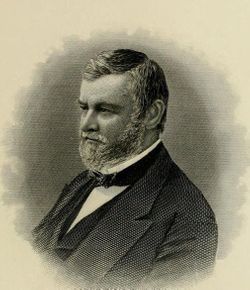Inscription
Hon. Hiram Barber, a native of Hebron, Washington County, New York, was born January 25, 1800, and is the son of David Barber and Hannah nee Baker. His father, a farmer of Hebron, took part in the war of the revolution.
Hiram was obliged to pursue his studies at home, with the exception of one year's attendance at Fort Ann. At the age of nineteenth year, having become fully competent to teach school, he devoted the winters of the four following years to this employment. On the l0th of October 1843, he went to Milwaukee, Wisconsin, to follow the real-estate business. While thus engaged he located a farm in the vicinity of Juneau, and upon the marriage of his eldest son, he gave it to him to take charge of, and in 1863, removed to Horicon, Wisconsin, to engage in speculations and became a member of the firm of Van Brunt and Co., manufacturers of agricultural implements.
He has held the position of justice of the peace, to which he was elected in 1826; county judge of the courts of Warren County, New York, to which he was appointed by Governor Van Buren in 1829, and which he held until 1844, when, wishing to remove to Wisconsin, he resigned it. In 1846 he was a member of the constitutional convention, and assisted in framing the constitution of Wisconsin. Two years later he was appointed by Governor Dewey one of the Board of Regents to organize the State University, a position which he held for six years. In 1849 he was a member of the State assembly, and in 1874 was republican candidate for Congress in the fifth congressional district. Judge Barber was also a member of the first board of directors of the Milwaukee and La Crosse railroad, a position which he held for three years and then resigned.
He was married on April 8, 1824, to Miss Salome Seelye, by whom he has had three sons and three daughters, — the eldest son being a farmer, the second a successor to his father in his manufactory, and the third a lawyer in the city of Chicago.
Exert from: The US Biological Dictionary and Portrait Gallery of Eminent and Self-Made Men, Wisconsin Edition (1877) transcribed by Vicki Bryan
Family Members
Advertisement
Explore more
Sponsored by Ancestry
Advertisement







